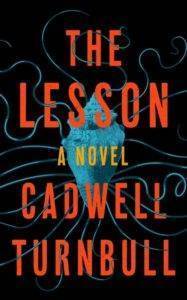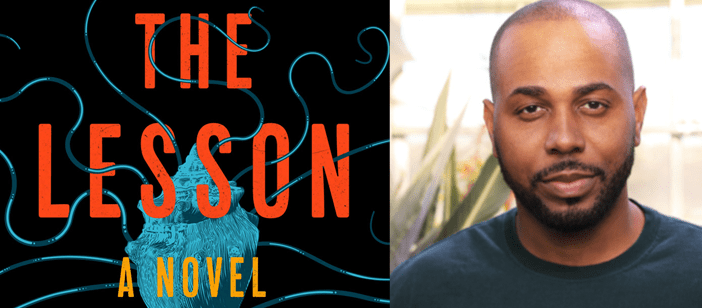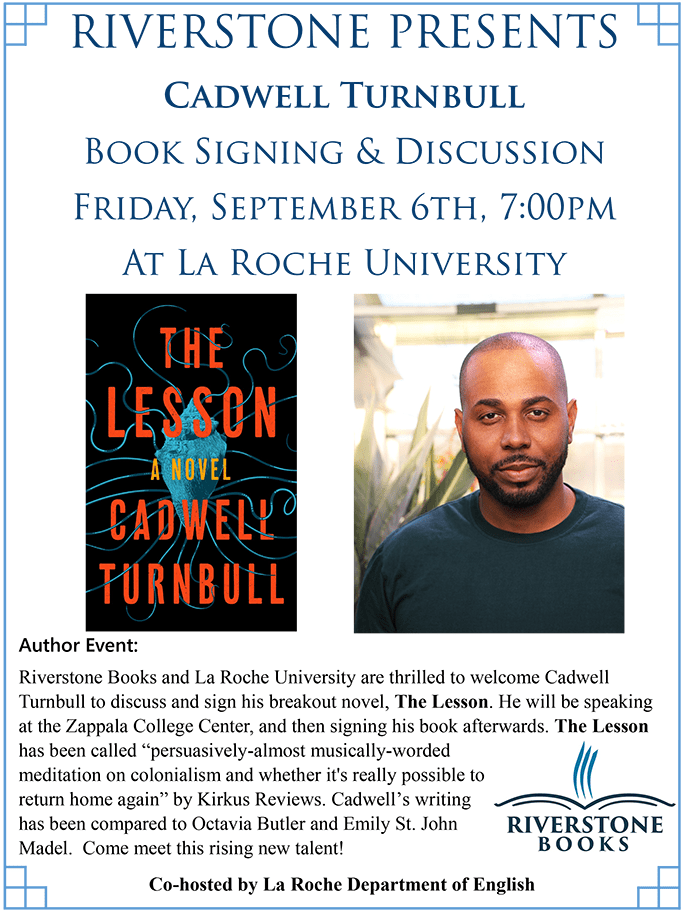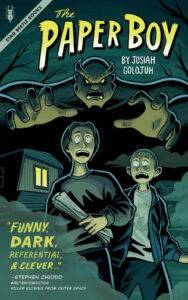“Like Octavia Butler and Ursula K. Le Guin before him, Turnbull uses the tools of science fiction to illuminate the human heart…” –John Kessel, Nebula Award-winning author of The Moon and the Other and Pride and Prometheus
From the Publisher: “An alien ship rests over Water Island. For five years the people of the US Virgin Islands have lived with the Ynaa, a race of superadvanced aliens on a research mission they will not fully disclose. They are benevolent in many ways but meet any act of aggression with disproportional wrath. This has led to a strained relationship between the Ynaa and the local Virgin Islanders and a peace that cannot last.
A year after the death of a young boy at the hands of an Ynaa, three families find themselves at the center of the inevitable conflict, witness and victim to events that will touch everyone and teach a terrible lesson.”
About the author: Cadwell Turnbull is a graduate from the North Carolina State University’s Creative Writing MFA in Fiction and English MA in Linguistics. He was the winner of the 2014 NCSU Prize for Short Fiction and attended Clarion West 2016. His short fiction has appeared in The Verge, Lightspeed, Nightmare, and Asimov’s Science Fiction. His Asimov’s short story “When the Rains Come Back” made Barnes and Noble’s Sci-Fi & Fantasy’s Short Fiction Roundup in April 2018. His Nightmare story “Loneliness is in Your Blood” was selected for The Best American Science Fiction and Fantasy 2018. His Asimov’s novelette “Other Worlds and This One” was also selected by the anthology as a notable story. The Lesson is his debut novel.
Don’t miss out: Riverstone Books and La Roche University Department of English are thrilled to welcome LaRoche alum Cadwell Turnbull back to Pittsburgh! Cadwell will be speaking and signing his amazing new book The Lesson at LaRoche University at the Zappala College Center on Friday, September 6th!
 What was your inspiration for The Lesson?
What was your inspiration for The Lesson?
The Lesson was inspired by a dream I had. Aliens had integrated into a small town, looking and acting like human beings, except when they felt threatened. In those situations, they had a heightened fight-response, maiming or killing those they felt threatened by. In my dream a group of humans were picking on an alien woman, pushing her and insulting her. She was trying not to kill them, but eventually did.
I might have just filed the dream away as a nightmare if it wasn’t for the alien woman’s feelings of guilt. Her attempt to live among humans without killing them was compelling to me. She also had a close relationship with a human man, which also interested me. When I was attending my MFA I decided to write stories set in a world where aliens had integrated into human society. I made the decision to set it in the U.S. Virgin Islands where I grew up (the original dream was set somewhere in the continental United States). The alien woman became Mera and the human man became Derrick, two central characters in the novel. Relocating the story also brought up some interesting parallels to colonialism and provided the context for a host of other characters. Eventually all the stories, themes and narrative threads became The Lesson.
How’d you discover your love of science fiction?
My first experience with the genre was through watching movies with my mother. I remember watching Star Trek: First Contact with my mom. We also had a copy of Frequency, a science fiction film starring Dennis Quaid and Jim Caviezel that I watched constantly. And then there was the film Happy Accidents with Marissa Tomei and Vincent D’onofrio that I watched at least a dozen times. I still consider it one of my favorite movies. I started watching Stargate SG1 in high school and have been a fan ever since. I also watched Buffy the Vampire Slayer and Charmed, which piqued my interest in fantasy.
In high school my favorite assigned reading was 1984 by George Orwell. We didn’t talk about it as a science fiction novel. It was a classic. But I think I was attracted to the speculative elements of the novel, imagining a dystopian future, exploring what that would mean for the people living in it. Speculative fiction stories allow for exploration of different times and places, playing out thought experiments that help us better understand ourselves.
In college a good friend recommended that I read The Lathe of Heaven by Ursula Le Guin. I absolutely loved that book and soon I started reading science fiction and fantasy books on my own. Le Guin remains my favorite genre writer and I consider her a major influence.
Did you know you wanted to be a writer when you attending La Roche University in Pittsburgh?
I knew I wanted to be a writer, but I didn’t know what sort of writer I wanted to be. La Roche University (La Roche College at the time) had a Professional Writing Bachelor’s degree which covered a number of writing disciplines including journalism, grant writing, technical writing, literary criticism and creative writing. I figured the degree was well-rounded enough to give me options after I graduated, so I applied and thankfully got in.
I’d never lived outside of the Virgin Islands, so moving to Pittsburgh, PA was exciting. I was grateful that I chose a degree that covered a number of disciplines. I learned enough about each that I felt I could pursue a number of them (specifically journalism, criticism, and creative writing). I did an internship at the Thomas Merton Center as an assistant editor for the publication The New People. I gained some hands-on journalism experience there, which I applied when I was a freelance reporter for the St. Thomas Source, a local Virgin Islands newspaper. I worked at the St. Thomas Source when I was on summer break from my MFA. My Creative Writing MFA at North Carolina State University pulled me back towards fiction as a potential future. I wouldn’t be half the writer I am without it. After my MFA I went to Clarion West, a six-week intensive workshop for science fiction and fantasy writers. At the workshop I found a community of incredibly talented writers that had the same genre aspirations I did. It opened me up, built my confidence, and gave me a set of career goals to work towards. I started publishing short stories soon after. Each opportunity came when I needed it and by the end, I had much better idea of the kind of writer I wanted to be.


























